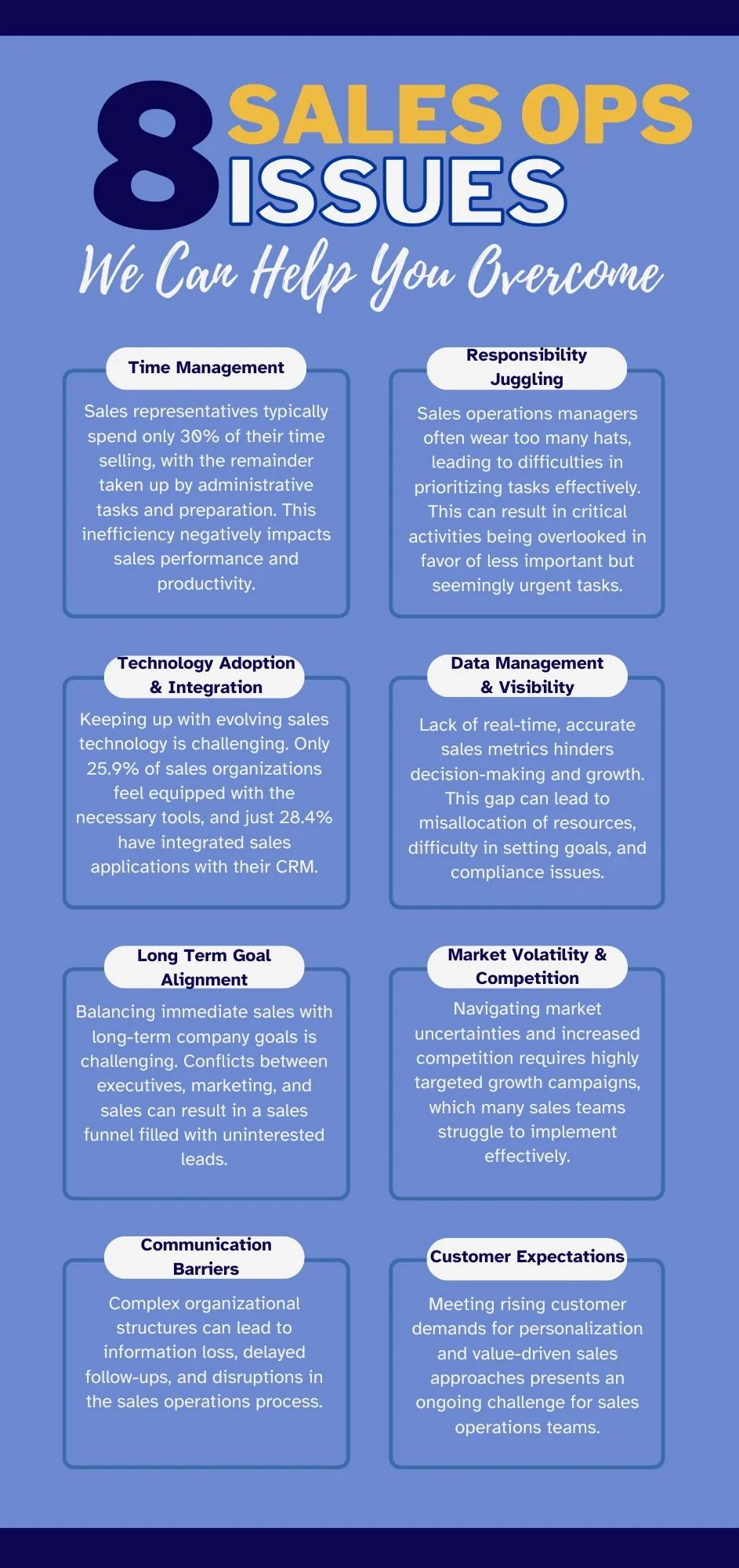The Essential Role of Sales Operations in Driving Growth
Sales operations are indeed as crucial as production in a modern sales organization.
Imagine your sales organization as a finely tuned engine. Just as an engine requires proper maintenance and optimization to perform at its best, your sales processes need the same level of attention and care. This is where sales operations come into play.
Sales operations encompass the functions and activities that keep frontline sales teams efficient and effective. They handle administrative and technical tasks, manage tools, processes, and data to improve sales productivity, giving reps more time to engage with customers.
The Cost of Poor Systems
The cost of poor systems in sales operations can be quite significant. Without strong procedural discipline or well-defined systems, organizations often face a host of challenges. These include unnecessary rework, excessive communication, and misaligned expectations.
Moreover, poor systems can lead to increased stress and tension with clients, as well as missed opportunities and lost revenue. It's worth noting that companies with dedicated sales ops tend to see higher team alignment and improved efficiency.
This alignment is crucial, as unclear expectations can often lead to sour business relationships. So, investing in robust sales operations isn't just about administrative support - it's about driving sales execution, optimizing operations, and creating value for your business.
The Connection to Customer Experience
Think back to your last unsatisfactory deal or poor customer experience. Chances are, it was rooted in poor communication or a lack of understanding during the deal-making process. Sales operations play a pivotal role in managing these customer interactions.
A high-functioning sales ops team ensures that workflows run without disruption and sales territories are aptly covered, allowing reps to focus on revenue-generating activities.
This systematic approach leads to well-managed customer interactions before, during, and after the deal-making moment, forming the foundation of long-lasting relationships.
Effective Sales Operations typically includes the following:
Data-driven decision making
Improved revenue forecasting
Optimized sales processes
Alignment between sales and marketing
Advanced performance metrics
These elements work together to create a more efficient, productive, and customer-focused sales environment.
Where to Focus First
Optimizing your sales organization can seem overwhelming. But don't worry, I've got you covered on where to focus first for your best shot at success.
Start by taking a good look at your current setup and assessing where the bottlenecks are in your sales process. This will help you pinpoint the areas that need the most attention.
Next, let's talk about your CRM. Make sure it's not just sitting there collecting dust – optimize it to address the key needs of your sales force. Trust me, a well-tuned CRM can be a game-changer.
Don't forget about implementing best practices. This means zeroing in on things like hiring and coaching your team, setting realistic quotas, and nailing your account targeting strategy.
Finally, build a solid business case by outlining the costs of lost sales and productivity from those gaps you identified earlier. This will help you make a compelling argument for investing in sales operations improvements.
By focusing on these areas, you'll be well on your way to a more efficient and effective sales organization.
What Great Sales Ops Can Do for You
Let's talk about the good stuff - the benefits you'll see when you implement robust sales operations. Trust me, it's not just about making your sales team's life easier (though that's definitely a perk).
First off, you'll notice your business becomes more scalable. With streamlined processes, growing your teams and expanding your business becomes a whole lot smoother. It's like upgrading from a rickety bicycle to a well-oiled machine.
Next up, your customer relationships will get a major boost. You'll gain deeper insights into what your customers really want, allowing for those personalized interactions that make them feel special. It's like being a mind reader, but with data!
Here's a big one - better alignment across your departments. Sales, marketing, and customer success will start working together like a dream team. No more finger-pointing or playing the blame game.
Now, let's talk money. With data-driven decisions and optimized processes, you're looking at higher conversion rates and revenue growth. Ka-ching!
Last but not least, your crystal ball gets a serious upgrade. Improved forecasting means you can predict revenue more accurately and plan your strategy with confidence. It's like having a GPS for your business journey.
Key Strategies
So, ready to supercharge your sales ops and reap these awesome benefits? Here are the most important strategies to implement for your optimal chances of success.
Invest in Technology
Leverage CRM platforms and data analytics tools to gain customer insights and streamline processes. Integrate defined processes and automate business logic workflows into the systems.
Focus on Training
Ensure your team understands and can effectively use the new systems and processes. Test comprehension with workshops and scenario testing examples.
Encourage Cross-Departmental Collaboration
Break down silos between sales, marketing, and customer success teams with aligned and complementary goals and budgets.
Leverage Data and Technology
Establish a robust governance framework for sales analytics to maintain data integrity and accuracy. Implement CRM systems and analytics platforms to gain deeper insights into customer preferences.
Optimize Performance Management
Develop a comprehensive framework that includes clear sales goals, key metrics tracking, and accountability mechanisms. Implement regular feedback and coaching sessions to align sales operations with business objectives.
Focus on Customer-Centric Strategies
Analyze sales data to identify patterns in customer purchases, feedback, and service interactions. Create opportunities for sales and customer service teams to interact through team-building activities and cross-training.
Putting It Into Action
I know this is a lot to take in at first, so let’s discuss a few easy action steps to take in order to get started. To implement robust sales operations and reap the benefits discussed throughout this post:
1. Assess your current gaps and bottlenecks in the sales process.
2. Optimize your CRM usage to address key needs of your sales force.
3. Implement best practices in hiring, coaching, quota setting, and account targeting.
4. Build a business case outlining the costs of lost sales and productivity from existing gaps.
5. Continuously analyze and adjust: Regularly review performance metrics and be prepared to adapt your strategies as needed.
Remember, investing in sales operations is not just about administrative support. It's about driving sales execution, optimizing operations, and creating value for your business.
By focusing on these key areas, you're sharpening your organization's competitive edge through strong customer relationships, well-defined processes, and smart data insights.
If you need help with any of this or other sales issues, don’t hesitate to contact me for a free consultation: (513) 399-6994, kevin@lighthousesalesadvisors.com, or book a call with me.
If it’s helpful, don’t forget to Pin this image for later!




